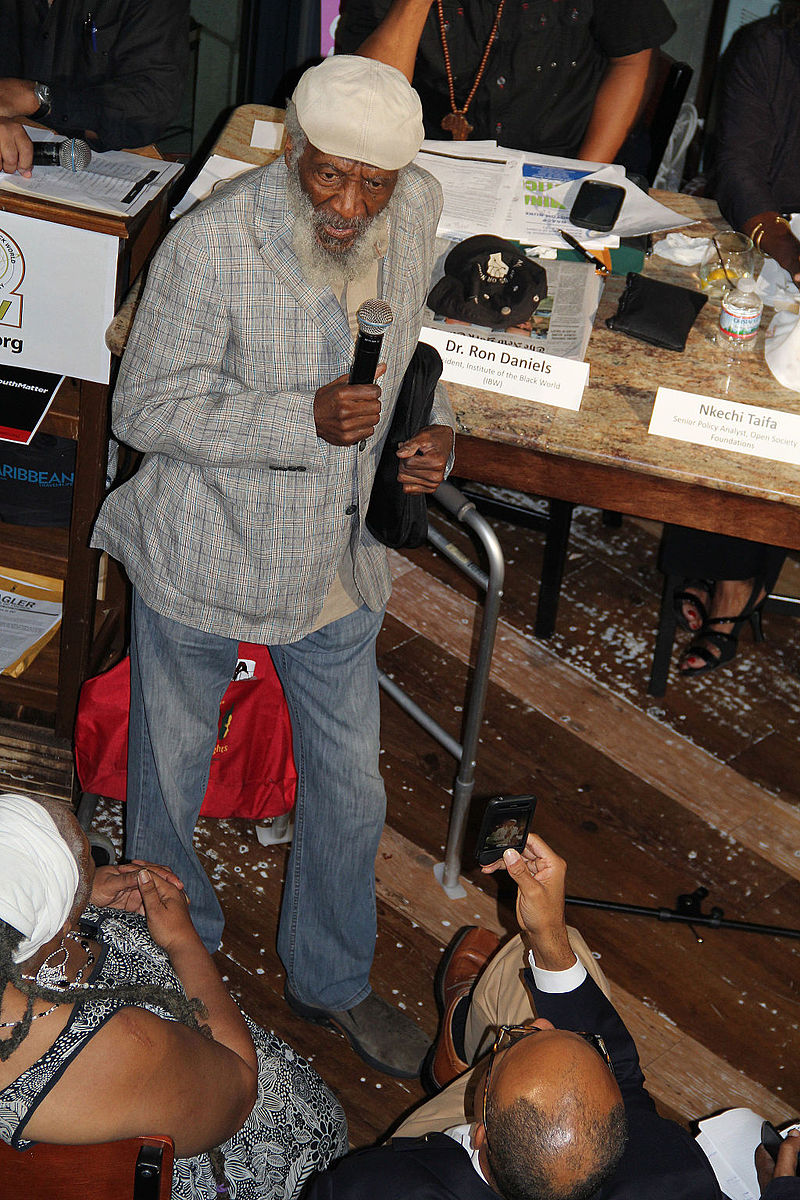Dick Gregory Took Us All on a Strange and Powerful Trip
Comedian, civil-rights activist, food guru, and conspiracy theorist made America a better, more thoughtful place.

The comedian and activist Dick Gregory has died at the age of 84. Talk about a career that's virtually impossible to categorize. From avant-garde joke teller to civil-rights figure to diet guru to conspiracy mongerer, he lived a full life that in many ways mirrors all the twists and turns of American life over the past 50 or 60 years. He was relentlessly pessimistic about the state of the country even as he inspired his audience to work for change. I found him interesting because he was always out there on the horizon, lighting a path—albeit often one not particularly grounded in facts—that many of us would be following down soon after.
Born in St. Louis in 1932, Gregory ran track for Southern Illinois University in Carbondale on a scholarship, got drafted, and eventually ended up in Chicago, where he became one of the hottest entertainers of the early 1960s. Hugh Hefner of Playboy, which was still headquartered in the Windy City, was a huge fan and helped to massively increase Gregory's audience. Like Lenny Bruce and other cutting-edge comics of the time, Gregory played with social conventions in a way that was both thrilling and nervous-making. "Segregation is not all bad," went a characteristic one-liner. "Have you ever heard of a collision where the people in the back of the bus got hurt?" He was a regular presence at civil rights events during the '60s, ran for president, authored a popular natural-foods cookbook in 1974, Dick Gregory's Natural Diet for Folks Who Eat: Cookin' with Mother Nature and helped popularize the idea of healthy fasting. "When I look at the obituaries," he once quipped, "I don't see no one but all you eaters."
He was a fixture on the college tour circuit by the 1980s, when I saw him perform at Rutgers, and his monologues were shot through with frankly insane conspiracy theories (I vaguely recall him claiming that the victims of the Atlanta child murders had been mutilated in a way that suggested a government cover-up). An immediate critic of the Warren Report on the JFK assassination, he dismissed official accounts of 9/11 as well, even declaring a liquid fast until the "true story" was made available. Unsurprisingly, he taped a long appearance with Alex Jones about 9/11.
In 1964 he published a memoir, co-authored by famed sportswriter and novelist Robert Lipsyte (Reason interview here), controversially titled Nigger. Gregory later said that he wished he'd chosen a different title, but he dedicated the volume to his mother with the note,
Dear Momma—
Wherever your are, if you ever hear the word "nigger" again, remember they are advertising my book.
The opening chapter of Nigger, in which Gregory chronicles a Christmas when his absent father ("a real Capone with the whores and the bitches") comes home and beats his wife, son, and mistress, is one of the most painful accounts of black rage that America has sadly produced. It stands with passages from Frederick Douglass, Richard Wright, and James Baldwin in its anger, empathy, and pain. For anyone interested in the black family and the way in which mother-son dynamics get forged in a culture of absentee fathers, Gregory's autobiography is invaluable. The book's documentation of segregation and its effects on American culture should be required reading for those of us who didn't live through that period or have forgotten its reality. His turn to conspiracist thinking allows insight into how minorities who have suffered systematically at the hands of a dominant culture search for meaning and understanding in a hostile world. Dave Chapelle's recent Netflix specials explicitly discuss this tendency among blacks, and it's a predilection that extends to other groups of people who feel marginalized. In Donald Trump's America, understanding the complaints (without necessarily endorsing them) of people who feel pushed to the fringe of society is more important than ever.
In 2010, I covered the "One Nation Rally for Jobs, Justice, and Education" that had been organized by Ed Schultz, then at MSNBC. The various luminaries on the main stage included Jesse Jackson, Charles Rangel, Al Sharpton, and Dick Gregory, who said that the United States was not in a better place than in 1968. His comments appear at 50 seconds and at the 4:25 mark.
Farewell, Dick Gregory. You made your country a more thoughtful place and a better one, even if you think we were going downhill your entire life.


Show Comments (37)